Select Works of Carl Braaten (5 vols.)
Digital Logos Edition
Overview
Carl Braaten has been a leading Lutheran theologian for over 50 years. Declaring himself “evangelical without being Protestant, catholic without being Roman, and orthodox without being Eastern,” throughout his career, Braaten has set forth a compelling vision for church unity based upon the core of historic Christianity. Although Braaten built upon the historic creeds and doctrines of the church, his work is forward looking—addressing the current context of the Western church.
This collection brings together some of Braaten’s most influential writings, as well as work from those he inspired with his theological vision. Essay collections include contributions from leading Catholic, Episcopal, Lutheran, Methodist, and Orthodox theologians. The breadth of contributors demonstrates Braaten’s wide influence, especially in the area of ecclesiology. His work helps readers engage in recent issues within Lutheran and broader evangelical scholarship.
In the Logos editions, these volumes are enhanced by amazing functionality. Important terms link to dictionaries, encyclopedias, and a wealth of other resources in your digital library. Perform powerful searches to find exactly what you’re looking for. Take the discussion with you using tablet and mobile apps. With Logos Bible Software, the most efficient and comprehensive research tools are in one place, so you get the most out of your study.
Get these works and many others with the Eerdmans Lutheran Thought and History Collection (15 vols.).

Key Features
- Studies recent issues in Lutheran and evangelical ecclesiology
- Collects work from a broad spectrum of evangelical scholars inspired by Braaten
- Includes Carl Braaten’s theological memoir
Product Details
- Title: Eerdmans Carl Braaten Collection
- Publisher: Eerdmans
- Volumes: 5
- Pages: 1,047
- Christian Group: Lutheran
- Resource Type: Monographs, Collected Essays
- Topic: Ecclesiology
Individual Titles
- Union with Christ: The New Finnish Interpretation of Luther edited by Carl E. Braaten and Robert W. Jenson
- Marks of the Body of Christ edited by Carl E. Braaten and Robert W. Jenson
- Critical Issues in Ecclesiology: Essays in Honor of Carl E. Braaten edited by Alberto L. Garcia and Susan K. Wood
- That All May Believe: A Theology of the Gospel and the Mission of the Church by Carl E. Braaten
- Because of Christ: Memoirs of a Lutheran Theologian by Carl E. Braaten
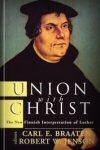
This important book introduces the English-speaking world to the new Finnish interpretation of the theology of Martin Luther, initiated by the writings of Tuomo Mannermaa of Helsinki University.
At the heart of the Finnish breakthrough in Luther research lies the theme of salvation. Luther found his answer to the mystery of salvation in the justifying work of Christ received through faith alone. But Protestant theology has never enjoyed a consensus on how to interpret the Reformation doctrine of justification by faith. In opposition to the traditional forensic understanding of justification, Mannermaa argues that for Luther, “Christ is really present in faith itself.” Mannermaa’s interpretation of Luther’s view of justification is thus more ontological and mystical than ethical and juridical. As such, his work challenges a century of scholarly opinion concerning a foundational doctrine of Protestant theology.
Contents and Contributors:
- “The Finnish Breakthrough in Luther Research,” Carl E. Braaten and Robert W. Jenson
- “Why Is Luther So Fascinating? Modern Finnish Luther Research,” Tuomo Mannermaa
- “Justification and Theosis in Lutheran-Orthodox Perspective,” Tuomo Mannermaa
- “Christ as Favor and Gift: The Challenge of Luther’s Understanding of Justification,” Simo Peura
- “What God Gives Man Receives: Luther on Salvation,” Simo Peura
- “Natural Law and Faith: The Forgotten Foundations of Ethics in Luther’s Theology,” Antti Raunio
- “Luther and Metaphysics: What is the Structure of Being according to Luther?” Sammeli Juntunen
- “Salvation in the Lutheran-Orthodox Dialogue,” Risto Saarinen
The editors are to be congratulated for offering for the first time in English a handy synopsis of current Finnish scholarship on Luther by its leading proponents, whose theories have attracted considerable attention in recent times.
—Theology Today
The reflective pastor will be able to recognize new angles for preaching and teaching that run counter to traditional conceptions.
—Word & World
This excellent volume of essays by the recent or ‘new’ Finnish Lutheran scholars is just such a find.
—St. Vladimir’s Theological Quarterly
Carl E. Braaten is professor emeritus of systematic theology at Lutheran School of Theology at Chicago and former executive director of the Center for Catholic and Evangelical Theology. He is the author of Who Is Jesus? Disputed Questions and Answers and Because of Christ: Memoirs of a Lutheran Theologian, and the editor of Church Unity and the Papal Office.
Robert W. Jenson is codirector of the Institute for Theological Inquiry and was cofounder and longtime associate director of the Center for Catholic and Evangelical Theology. Jenson is the author of Brazos Theological Commentary on the Bible: Ezekiel and Interpretation: A Bible Commentary for Teaching and Preaching Song of Songs, and the coeditor of Union with Christ: The New Finnish Interpretation of Luther.
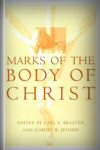
Martin Luther once listed seven “marks” of the church—those defining ecclesial features that show where the true church is to be found. This insightful volume brings together essays by 10 leading Catholic, Episcopal, Lutheran, Methodist, and Orthodox theologians, each analyzing one of the seven traditional marks of the church and discussing how it is found, or not found, in today’s churches.
Contents and Contributors:
- In Place of a Preface: Martin Luther on “Seven Marks of the Church”
- “The Word That Kills and Makes Alive” by Gerhard O. Forde
- “Resurrection and Rhetoric” by Richard Lischer
- “Baptism as a Mark of the Church” by Susan K. Wood
- “Baptism and the Church’s Faith” by John H. Erickson
- “The Eucharist as the Criterion of Orthodoxy: A Study of St. Ignatius of Antioch” by K. Paul Wesche
- “The Eucharist in the Church” by Richard A. Norris Jr.
- “The Office of the Keys: On the Disappearance of Discipline in Protestant Modernity” by David S. Yeago
- “The Special Ministry of the Ordained” by Carl E. Braaten
- “Catechesis for Our Time” by Robert W. Jenson
- “On Making Disciples of the Lord Jesus Christ” by William J. Abraham
This is a delightful romp through Luther’s seven marks of the church. . . . Is it possible that the North American evangelical world will start taking its ecclesiology seriously again? This book is a hopeful sign.
—Calvin Theological Journal
Insofar as the authors offer not only descriptive, but critical, insight on proclamation, baptism, Eucharist, the office of the Keys, ordination, catechesis, and discipleship, they invite wide ecumenical discussion on the state of the Christian church today.
—Religious Studies Review
Carl E. Braaten is professor emeritus of systematic theology at Lutheran School of Theology at Chicago and former executive director of the Center for Catholic and Evangelical Theology. He is the author of Who Is Jesus? Disputed Questions and Answers and Because of Christ: Memoirs of a Lutheran Theologian, and the editor of Church Unity and the Papal Office.
Robert W. Jenson is codirector of the Institute for Theological Inquiry and was cofounder and longtime associate director of the Center for Catholic and Evangelical Theology. Jenson is the author of Brazos Theological Commentary on the Bible: Ezekiel and Interpretation: A Bible Commentary for Teaching and Preaching Song of Songs, and the coeditor of Union with Christ: The New Finnish Interpretation of Luther.
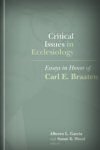
This volume compiles essays that engage important issues faced by the Christian church in witness and ministry.
Renowned for his unique slant on ecclesial affiliation—by his own confession “evangelical without being Protestant, catholic without being Roman, and orthodox without being Eastern”—Lutheran theologian Carl E. Braaten has long been a respected voice in ecclesiological discourse. In Critical Issues in Ecclesiology, 11 authors from a variety of church traditions come together to honor Braaten in a volume that seeks the renewal of the church, the clarifying of its catholic evangelical witness to the apostolic faith, and the restoration of its “passion for mission” within the great tradition.
Contributors:
- James M. Childs
- Gabriel Fackre
- Alberto L. García
- Timothy George
- Robert W. Jenson
- Joseph L. Mangina
- Cheryl M. Peterson
- Michael Root
- Leopoldo A. Sanchez M.
- Frank C. Senn
- Susan K. Wood
Alberto L. García is professor of theology at Concordia University Wisconsin, where he directs the lay ministry program. Among his books are The Theology of the Cross for the Twentieth Century and Cristología: Cristo Jesús Centro y Praxis del Pueblo de Dios.
Susan K. Wood is professor and chair of the department of theology at Marquette University. Her books include The Ecumenical Implications of the Doctrine of Baptism and Ordering the Baptismal Priesthood: Theologies of Lay and Ordained Ministry.
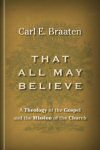
That All May Believe brings an evangelical catholic theological perspective to bear on controversial issues having to do with the truth of the gospel, the ecumenical quest for church unity, and the encounter of Christianity with other world religions. Here Carl Braaten argues and demonstrates that a theology may be evangelical without being Protestant, catholic without being Roman, and orthodox without being Eastern.
In sharp contrast to the older style of doing theology to bolster a particular denominational tradition or the newer style that revises the Christian faith to conform to modern culture, the ecumenical orthodoxy that emerges here does theology out of the common biblical and creedal mainstream of the Christian tradition. Braaten focuses on the core of Christianity—faith in Jesus Christ according to the Scriptures. He applies the criterion of Christ to many questions of Christian theology, pointing the way to a more complete and foundational theology for today.
Written with clarity, insight, and conviction, That All May Believe is Braaten at his very best. A must-read for Christians in the northern hemisphere.
—Karl P. Donfried, Elizabeth A. Woodson Professor Emeritus of Religion, Smith College
We are in the author’s debt for charting the right course toward visible unity and full communion for a church solid in its centralities and passionate about its mission.
—Gabriel Fackre, abbot professor of Christian theology emeritus, Andover Newton Theological Seminary
This timely book, confessionally anchored and ecumenically hopeful, will engage theological readers from beginning to end.
—Frank C. Senn, pastor, Immanuel Lutheran Church, Evanston, IL
Carl E. Braaten is professor emeritus of systematic theology at Lutheran School of Theology at Chicago and former executive director of the Center for Catholic and Evangelical Theology. He is the author of Who Is Jesus? Disputed Questions and Answers and Because of Christ: Memoirs of a Lutheran Theologian, and the editor of Church Unity and the Papal Office.
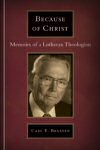
In this compelling memoir, Carl Braaten tells the story of his life as a theologian, from his early years as a missionary kid in Madagascar, to his years of study at the universities of Paris, Harvard, Heidelberg, and Oxford, to his decades of teaching. Throughout his narrative Braaten delves into the many theological movements, controversies, and personalities that have shaped his thinking and writing.
A well-written theological autobiography, Because of Christ is an intellectual travelogue par excellence, an informed chronicle of the chief theological conflicts of the twentieth century that have put the integrity of the gospel to the test.
Carl E. Braaten is professor emeritus of systematic theology at Lutheran School of Theology at Chicago and former executive director of the Center for Catholic and Evangelical Theology. He is the author of Who Is Jesus? Disputed Questions and Answers and Because of Christ: Memoirs of a Lutheran Theologian, and the editor of Church Unity and the Papal Office.
This title is included in the following collections
You can save when you purchase this product as part of a collection.
 Lutheran Thought and History C...$342.77$273.99
Lutheran Thought and History C...$342.77$273.99Logos 9 Lutheran Gold Legacy L...
$849.99$849.99Logos 9 Lutheran Platinum Lega...
$1,499.99$1,499.99Logos 7 Lutheran Diamond Legac...
$2,999.99$2,999.99
- $2,999.99
- $4,512.95$3,599.99
- $4,749.99
- $4,749.99
- $11,399.99
- $21,749.99
- $24,999.99
- $37,403.33$27,999.99